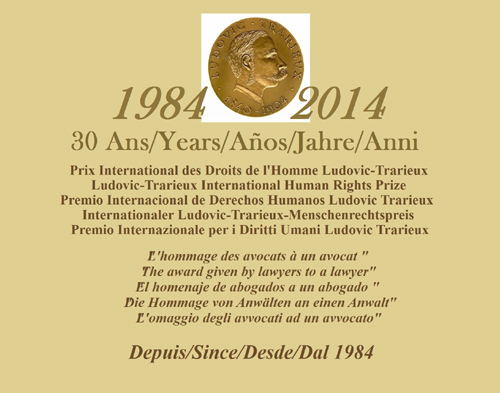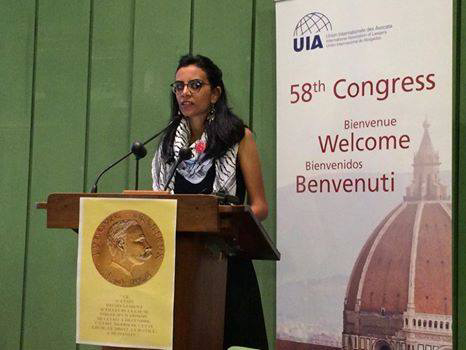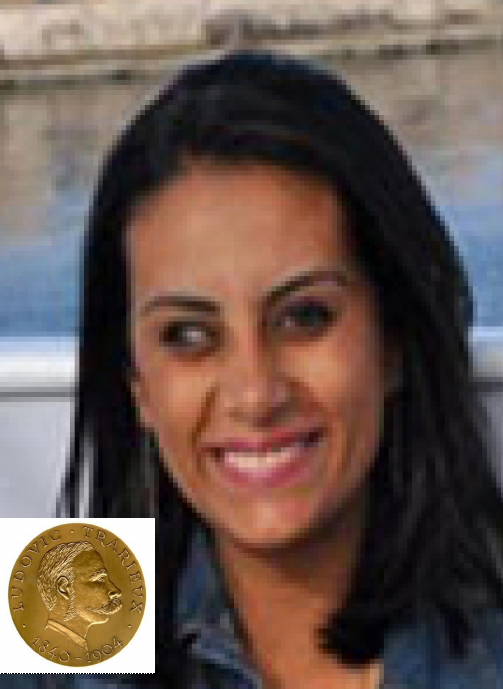
THE LUDOVIC-TRARIEUX PRIZE 2014 (French Only)
THE LUDOVIC-TRARIEUX PRIZE 1985 (PDF)
The 19th
"Ludovic-Trarieux" Human Rights Prize 2014
awarded
to

Mahinour al-Masry
(Egypt)
"Ludovic-Trarieux" Prize
2014
« …detained during the eras of Mubarak and Morsi, as well as during the current era of al-Sissi… »
The 19th "Ludovic-Trarieux"
Human Rights Prize 2014
The Jury of 24 european
lawyers, representing bars from Paris, Bordeaux, Amsterdam, Berlin,
Brussels, Geneva, Roma, Luxemburg, and members of Union Internationale
des Avocats ans European Bar Human Rights Institute
(IDHAE) and of Union Internationale des Avocats (UIA)[i],
meeting in Maison du barreau
de Paris, awarded the 19th "Ludovic-Trarieux, to Mahinour al-Masry, a lawyer in Alexandria.
Since May
20th 2014, she is serving a two-year jail sentence for organizing an unauthorized
protest.
The Jury
launched an appeal to Egyptian authorities to release Mahinour al-Masry, immediately and without conditions. She was released on September 21st 2014.
Mahienour el-Massry was invited in Florence (Italy) and received the
Prize in a Ceremony,
on October 31st 2014, on occasion of the Congress of
UIA, in presence of worldwide coming lawyers.
This
European Prize, which is celebrating this year its thirty jubilee, is funded by
main European bars and major lawyers organizations fighting for human rights.
THE
LUDOVIC-TRARIEUX PRIZE 2014 (Speech by Mahienour El Massry)

Known by most political activists, Masry is a member of the Revolutionary Socialists movement,
and has always been outspoken as to the rights of detainees and political
prisoners, with a history of activism in many labor movements, and on behalf of
Syrian and Palestinian refugees in Egypt.
Mahinour al-Masry, an
Egyptian lawyer and activist who has been detained during the eras of both
former presidents Hosni Mubarak and Mohamed Morsi, as
well as during the current era of Interim President, now faces threat of
imprisonment once again in the Mansour-Sisi era, as
she preferred to name it. Masry and six others were
detained on Dec. 2, 2013 in Alexandria for protesting without permission in
front of the Alexandria Courthouse. They were protesting in solidarity with
Khaled Said, whose brutal 2010 death while in state custody helped sparked the
2011 January 25 Revolution.
In January 2014, Mahinour
al-Masry was sentenced in absentia to two years in
jail and to a fine of 50,000 EGP, for protesting in December in solidarity with
Khaled Said, whose brutal death in 2010 while he was in custody lead to the
2011 January 25 Revolution. On May 20, 2014, the Sidi
Gaber Misdemeanour Court in
Alexandria upheld The two-year jail sentence against
activist Mahinour al-Masry
and fined her 50,000 EGP for organizing an unauthorized protest. Mahinour al-Masry was detained on
May 20th 2014, to serve her sentence in jail. On May 22nd, the Egyptian
security forces violently repressed participants to a solidarity march organised outside the headquarters of the Egyptian Center
for Economic & Social Rights (ECESR) in Alexandria, following a press
conference organized to show support for Ms. Mahinour
al-Masry,
Moreover, Mahinour
al-Masry is also facing trial on separate charges for
an incident that occurred in March 2013, qualified as “assaulting security
forces”, after she and other lawyers went to Raml
police station to provide legal assistance to three activists who were arrested
and sent to the police by supporters of the Muslim Brotherhood. The lawyers
were attacked by the police in the police station, and Mahinour
al-Masry was detained briefly before the Prosecution
decided to release her and the others. Lawyers in solidarity with the detainees
have decided to carry-out a sit in at Al-Raml
Prosecution to protest, then all protesters were beaten during the protest and
13 were arrested.
The case was referred to court only on May 8,
2014, but the appointed judge resigned from the bench, and the next hearing
before a different circuit is scheduled for end June 2014.
During an interview with Al-Wadi, she
declared that the regime is not different from Mubarak’s one, and that its
actions took a more violent form, as state institutions have unanimously agreed
upon suppression of human rights, namely that the government wants to suppress
opinions under the cover of fighting terrorism.
She continued that Mubarak imposed the state
of emergency for thirty years using counter-terrorism as an argument, but this
law was applied on all young people who demanded freedom and justice, and that
military trials also included workers.
She further noted that since the revolution,
the Egyptian state did not undertake any laws to facilitate the restoration of
companies that were privatized, or important companies, such as Ezz Steel,
which still achieves profits, and its profits still go to Ahmed Ezz’s bank
accounts.
She further stated that in the case in which she was
charged with violation of the protest law, she has been protesting with only 19
other demonstrators. She added that despite this, security forces attacked them
with tear gas and arrested some of them.
Created in 1984,
the "International Human Rights Prize Ludovic -Trarieux” is awarded to
" a lawyer, regardless of nationality or Bar, who thoroughout his career
has illustrated, by his activity or his suffering, the defence of human rights,
the promotion of defence rights, the supremacy of law, and the struggle against
racism and intolerance in any form ".
It is the oldest
and most prestigious award given to a lawyer in the world, commemorating the
memory of the French lawyer, Ludovic Trarieux (1840-1904), who in the midst of
the Dreyfus Affair, in France, in 1898, founded the " League for the
Defence of Human Rights and the Citizen ", because, he said: " It was
not only the single cause of a man which was to be defended, but behind this
cause, law, justice, humanity ".
The
first Prize was awarded on March 29th, 1985 to Nelson Mandela then in jail. It
was officially presented to his daughter, Zenani Mandela Dlamini, on April 27th
1985, in front of forty presidents of Bars and Law Societies from Europe and
Africa. It was the first award given to Mandela in France and the first around
the world given by lawyers. On February 11th 1990, Nelson Mandela was released.
Since then, it was decided that the Prize would be awarded again.
Since 2003, the Prize is awarded
every year in partnership by the Human Rights Institute of The Bar of Bordeaux,
the Human Rights Institute of the Bar of Paris, the Human Rights Institute of
The Bar of Brussels, l'Unione forense per la tutela dei diritti dell'uomo
(Roma), Rechtsanwaltskammer Berlin, the Bar of Luxemburg, the Bar of Geneva,
the Bar of Amsterdam as well as the Union Internationale des Avocats (UIA), and
the European Bar Human Rights Institute (IDHAE) whose members are the biggest
european law societies fighting for human rights. It is presented every year in
a city that is home to one of the member Institutes.
The following is the list of
prize winners :
1985:
Nelson MANDELA (South Africa)
1992: Augusto ZÚŃIGA PAZ (Peru) †
1994: Jadranka CIGELJ (Bosnia-Herzegovina)
1996 Nejib HOSNI (Tunisia) and Dalila MEZIANE (Algeria).
1998 ZHOU Guoqiang (China)
2000 Esber YAGMURDERELI (Turkey)
2002 Mehrangiz KAR (Iran)
2003 Digna OCHOA and Bárbara ZAMORA (Mexico)
2004: Akhtam NAISSE (Syria)
2005: Henri BURIN DES ROZIERS (Brazil)
2006: Parvez IMROZ (India)
2007 : René GÓMEZ MANZANO (Cuba)
2008 : U AYE MYINT (Burma)
2009 : Beatrice MTETWA (Zimbabwe)
2010 : Karinna MOSKALENKO (Russia)
2011 : Fethi TERBIL (Libya)
2012 :
Muharrem ERBEY (Turkey)
2013 :
Vadim KURAMSHIN (Kazakhstan)